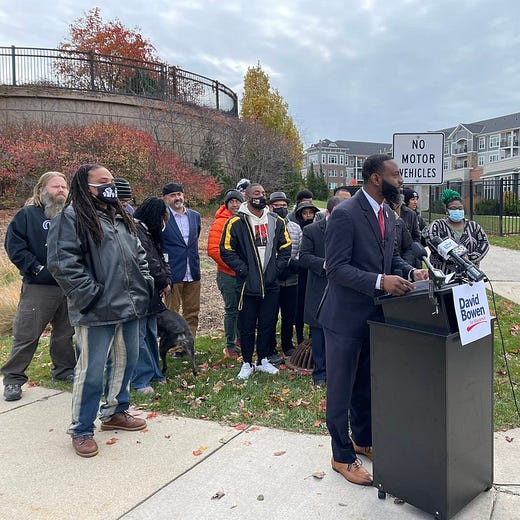A Preview of the 2022 Elections in Wisconsin (Part II: Governor, Attorney General, Lieutenant Governor)
What do Tony Evers' chances at re-election look like? Will it be Rebecca Kleefisch or someone else for the GOP? Who will the Dems choose as lieutenant governor with Mandela Barnes running for Senate?
The Recombobulation Area is an award-winning weekly opinion column by veteran Milwaukee journalist Dan Shafer. Learn more about it here.

With less than a year to go before the 2022 midterm elections, we’re taking a look ahead here at The Recombobulation Area. If you missed Part I on the big picture for 2022 and the race for U.S. Senate, head over here.
In Part II, we’re taking a look at races for governor, attorney general, and lieutenant governor.
Let’s dive in.

THE RACE FOR GOVERNOR
Re-electing Tony Evers as governor is the most important thing Democrats can do in Wisconsin in 2022, full stop. Without him in that position, the state quickly becomes a vessel for the worst of far-right state-level politics happening across the country at a time when Republicans are increasingly flirting with the most dangerous forces within their party. A GOP victory in this race is legitimately worrisome for the future of this state.
And Evers has fought hard for the people of Wisconsin on so many key issues, particularly on public health during the pandemic. When the Republican-controlled legislature finally got out of his way, his administration piloted one of the most successful vaccine rollouts in the nation. Even Republican Assembly Speaker Robin Vos could help but praise the Evers administration on a job well done. Evers has been on the right side of just about every issue during a time of genuine crisis, and that earns him a chance at a second term.
The midterm winds are very much against him, though. The former superintendent of public instruction won the governor’s race by just 1.1% in 2018, and even if 2022 doesn’t prove to be as bad for Democrats as some might expect, it’s certainly not going to be a repeat of 2018’s “blue wave” that helped Evers toward victory.
In the most recent Marquette University Law School Poll, Evers just saw a net-negative favorability rating (42% favorable, 45% unfavorable), but it was actually his first net-negative favorability rating in 25 polls, so it remains to be seen if this is an outlier. In contrast, Scott Walker had frequent net-negative numbers for much of his second term, with zero (!) net-positive ratings in 2015 or 2016.
Despite unrelenting Republican obstruction and criticism, Evers has generally been a well-liked and popular governor. In particular, he has consistently had high approval on how he’s handled the pandemic. Even in a down poll, 53% approve of the job he’s doing on the issue, with only 40% disapproving. A moderate himself, he continues to have high marks among moderates in the state — 54% approve, and 35% disapprove among that group.
The Democratic governor has been in a constant battle with the Republican-controlled legislature — and when that legislative body works to strip your powers before you even take office, that tends to set a certain tone for how things will go -- and that legislature is not particularly well-liked in statewide polls, with approval ratings consistently below 40% dating back to fall of 2020.
The bigger picture is working against Democrats for 2022, and a full-blown backlash election like what we saw in 2010 could certainly do Evers in. But there are some underlying strengths for Evers that need to be taken into consideration, even in a potential down year for his party. And of course, it matters who it is he’ll be running against.
THE REPUBLICAN PRIMARY FOR GOVERNOR
The Republican gubernatorial primary got really confusing over the last month. For a while, it seemed like former lieutenant governor Rebecca Kleefisch was going to cruise to the nomination. She has essentially been running since Walker lost in 2018 and her coronation seemed rather inevitable. With few challengers emerging outside of Kevin Nicholson, who is yet to decide which race he’ll lose, she seemed to be running in a pretty clear field.
But then Donald Trump swooped in and upended the primary by saying that former congressman Sean Duffy should run. Duffy is reportedly considering it, and a Duffy-Kleefisch primary could get messy for Republicans.
State Rep. John Macco of Ledgeview is also reportedly considering a run for governor, and has been connected to former Senate candidate Eric Hovde and lobbyist Bill McCoshen, who recently opted against a run for governor.
Duffy could have a real shot, and Macco would appear to be a long-shot candidate, but the bigger the field, the more complicated this gets for Kleefisch. Which begs the question: Why aren’t Republicans rallying behind her?
The main challenge for Kleefisch going into this race is whether she can bridge the more suburban support she enjoyed as Walker’s lieutenant governor from 2011 to 2019 with the more rural, Trumpian base that emerged in 2016 and was further cemented in 2020. Former state senator Leah Vukmir, a fellow Waukesha County resident, failed in a similar test when she lost by double-digits to Tammy Baldwin in 2018.
Kleefisch is a formidable candidate, and a better one than Vukmir, and people should not be quick to doubt her. It matters, too, that she would be running to be the first woman to be elected governor in Wisconsin, which would be a tremendous achievement. So it is curious, then, that Republicans are still looking elsewhere at this stage of the race.

For Duffy, with the backing of Trump — who is still the party’s standard-bearer and could very well be the presidential nominee in 2024 — he has a real shot at winning the primary. But he would be a stronger primary candidate than a general election candidate. In a general election, Trump’s bullhorn support isn’t as much of an asset.
Until Duffy makes a decision, it’s too soon to predict who will emerge from the GOP primary. But whoever wins that race has a real shot at becoming Wisconsin’s next governor, and could even be the favorite to do so. No matter what, Democrats are going to have their work cut out for them in their efforts to re-elect Tony Evers.
THE RACE FOR ATTORNEY GENERAL
Democrat Josh Kaul is running for re-election, and while his fate could be tied to a wave year much like Evers, he seems to be standing on relatively solid ground. He’s done well in his first term in the office. His case for another four years is pretty straightforward.
The Republican primary has already been rocky. UW-Madison professor Ryan Owens, the early fundraising leader, dropped out of the race in October. He faced criticism over deleting old podcasts that featured Trump critics. I guess that’s the only type of thing that can really get you in trouble in the Republican Party these days.
That left Fond du Lac District Attorney Eric Toney as the only candidate left in the race, but that was before former state representative Adam Jarchow joined in. Jarchow is maybe the least successful state GOP candidate in recent years. He lost by 11% in a deep red district in a bid for State Senate in 2018 (Republican Rob Stafsholt won it back by a 20% margin in 2020). The race between Jarchow and Toney two is already getting weird.
It seems like there’s more to come in this race before the field is settled.
THE RACE FOR LIEUTENANT GOVERNOR
With Mandela Barnes leaving his post as lieutenant governor to run for U.S. Senate, it creates an opening on the Democratic ticket alongside Evers.
Three candidates have already announced their candidacies: State Senator Lena Taylor of Milwaukee, State Rep. Sara Rodriguez of Brookfield, and State Rep. David Bowen of Milwaukee.
Taylor’s announcement came as a surprise, as many in Democratic circles expected her to make another run for mayor. Her electoral history now includes losses to Scott Walker (Milwaukee County Executive, 2008) and Tom Barrett (Milwaukee Mayor, 2020) and a win against Mandela Barnes, who primaried her for her State Senate seat in 2016. Taylor has been very successful within her district, but less so when venturing outside of it. She’s also seen more as a maverick than a coalition-builder, which makes for an odd fit as lieutenant governor, where your job in many ways is to work to build support for the governor — a governor she hasn’t always agreed with. At the same time, she’s a talented politician and would make history as the first Black woman elected in the role.
Rodriguez last fall became one of three Democratic Assembly candidates to flip a seat under current gerrymandered maps. She won by about 2% in the west suburban 13th District, defeating four-term incumbent Rob Hutton. That election was her first foray into politics, and before getting on the ballot, worked as a registered nurse and was in health care management, including as an epidemic intelligence service officer for the Center for Disease Control and Prevention. Her announcement last week has been expected for some time, and insiders say she could be a strong candidate.
The success of her candidacy could be a signal of changing political winds in the Milwaukee area suburbs. Evers’ 2018 path to victory followed the more traditional map for Democratic victory in Wisconsin, with some success in some rural areas, including in the driftless region in the southwestern part of the state. But in 2022, his path might take him through the Milwaukee area suburbs, much as it did for Joe Biden in 2020, and Rodriguez could be an asset there.
Bowen, who made his announcement official on Monday, is in his fourth term in the State Assembly. The district he represents is among the most liberal in the state, and was +81 for Joe Biden in 2020. Bowen’s Assembly district is actually part of Taylor’s State Senate district, and both ran unopposed in 2020.
Bowen has been an outspoken participant in the Black Lives Matter movement, and is the type of young progressive who could connect with a diverse base in Milwaukee and Madison. However, his involvement in a protest at the home of now-former Wauwatosa police officer Joseph Mensah, who shot and killed three people in the line of duty, has made Bowen a real target for the frothing conservative media world in Wisconsin, despite dispute over the details of the incident. Then again, even as every politician saw their favorability go net-negative in the most recent Marquette poll, the one thing polled that did have a net-positive favorability was the Black Lives Matter movement — 45% favorable, 38% unfavorable — and that’s something the Democratic Party in particular should not ignore.
Taylor, Rodriguez and Bowen are each from the Milwaukee area, and that’s a sure sign that the city and the suburbs will play key roles for Democrats in 2022. With Barnes no longer on the ticket, Milwaukee needs some representation in a potential second term for the Evers administration. Other candidates could still emerge in the race before it heats up, but it could also be just those three.
All in all, the Democratic primary for lieutenant governor could be pretty intriguing.
On the Republican side, until the top of the ticket gets sorted out, it’s less interesting. Early contenders include Ben Voelkel, a longtime aide to Sen. Ron Johnson, and State Sen. Patrick Testin of Stevens Point. Former congressional candidate David King of Milwaukee and Lancaster Mayor David Varnam have also declared for the race. State Sen. Rob Stafsholt of New Richmond has also been mentioned as a potential candidate, and as a successful northern Wisconsin politician, would make sense as a good fit with Kleefisch, less so if it’s Duffy. On balance, Voelkel seems like a strong candidate overall.
Coming soon: Part III, on the race for Mayor in Milwaukee.
Dan Shafer is a journalist from Milwaukee who writes and publishes the award-winning column, The Recombobulation Area. He previously worked at Seattle Magazine, Seattle Business Magazine, the Milwaukee Business Journal, Milwaukee Magazine, and BizTimes Milwaukee. He’s also written for The Daily Beast, WisPolitics, and Milwaukee Record. He’s on Twitter at @DanRShafer.
Subscribe to The Recombobulation Area newsletter here and follow us on Facebook at @therecombobulationarea.
Follow Dan Shafer on Twitter at @DanRShafer.








